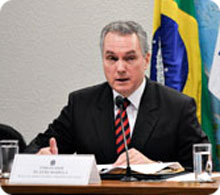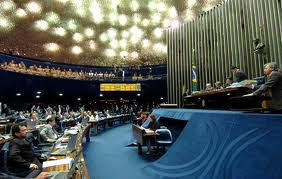Bilateral Relations:

Brazil-Saudi Arabia bilateral relations:
Diplomatic relations between Brazil and Saudi Arabia were established in 1968 and in 1973 both countries opened their embassies in Brasília and Jeddah. The Brazilian Embassy in Jeddah later moved to Riyadh in 1986. Following the opening of the embassies by both countries, an agreement for Economic and Technical Cooperation between Brazil and Saudi Arabia was signed in Brasilia on 2 April, 1975. The other major agreements were the Basic Agreement for Scientific and Technical Cooperation between the Government of the Federative Republic of Brazil and the Government of the Kingdom of Saudi Arabia, signed in Brasilia in 13 August 1981 and Protocol on industrial-military cooperation between the Government of the Federative Republic of Brazil and the Government of the Kingdom of Saudi Arabia signed in Brasilia in 1984.
 The Custodian of the two Holy Mosques, King Abdullah bin Abdulaziz Al Saud visited Brazil in 2000 while he was the Crown Prince. Several Ministerial level visits to and from Brazil took place prior to this visit and after, as well as several business, technical and official visits to Saudi Arabia from Brazil and vice versa. Last year, the Brazilian Embassy participated in two local trade fairs (Saudi Build Group and Saud Agriculture & Food Group). In 2009, Brazil was the ‘Guest of Honour’ at the International Book Fair organized by the Saudi Ministry of Culture and Information. Six academics and writers also participated in the seminar during this Fair.
The Custodian of the two Holy Mosques, King Abdullah bin Abdulaziz Al Saud visited Brazil in 2000 while he was the Crown Prince. Several Ministerial level visits to and from Brazil took place prior to this visit and after, as well as several business, technical and official visits to Saudi Arabia from Brazil and vice versa. Last year, the Brazilian Embassy participated in two local trade fairs (Saudi Build Group and Saud Agriculture & Food Group). In 2009, Brazil was the ‘Guest of Honour’ at the International Book Fair organized by the Saudi Ministry of Culture and Information. Six academics and writers also participated in the seminar during this Fair.
 In 2009, President Luiz Inácio Lula da Silva made the first visit by a Brazilian Head of State to the Kingdom of Saudi Arabia, accompanied by the Minister of External Relations, H.E. Celso Amorim, the Minister of Development, Industry and Foreign Trade, H.E. Miguel Jorge, and high ranking officials and a high-profile business delegation. During the visit of President Lula additional agreements were signed: (1) General Agreement on Cooperation; and (2) Memorandum of Understanding for the Establishment of Political Consultations. Other cooperation agreements were signed in the presence of President Lula: Memorandum of Understanding between the National Confederation of Industry (CNI) of Brazil and the Riyadh Chamber of Commerce and Industry; Memorandum of Understanding between the National Confederation of Industry (CNI) and the Council of Saudi Chambers; Memorandum of Understanding between Arab Brazilian Chamber of Commerce and the Riyadh Chamber of Commerce and Industry; Memorandum of Understanding between Arab Brazilian Chamber of Commerce and the Council of Saudi Chambers.
In 2009, President Luiz Inácio Lula da Silva made the first visit by a Brazilian Head of State to the Kingdom of Saudi Arabia, accompanied by the Minister of External Relations, H.E. Celso Amorim, the Minister of Development, Industry and Foreign Trade, H.E. Miguel Jorge, and high ranking officials and a high-profile business delegation. During the visit of President Lula additional agreements were signed: (1) General Agreement on Cooperation; and (2) Memorandum of Understanding for the Establishment of Political Consultations. Other cooperation agreements were signed in the presence of President Lula: Memorandum of Understanding between the National Confederation of Industry (CNI) of Brazil and the Riyadh Chamber of Commerce and Industry; Memorandum of Understanding between the National Confederation of Industry (CNI) and the Council of Saudi Chambers; Memorandum of Understanding between Arab Brazilian Chamber of Commerce and the Riyadh Chamber of Commerce and Industry; Memorandum of Understanding between Arab Brazilian Chamber of Commerce and the Council of Saudi Chambers.
The presence of Brazilian community in Saudi Arabia, though not in significant number if compared to the size of local expatriate community, is mainly formed by skilled professionals such as engineers, doctors, Information Technology and Aviation experts and other professionals associated with football.
The Arab community in Brazil is made up mainly of Syrians and Lebanese, although there are immigrants from practically all Arab nations in the country. They started arriving in Brazil in the nineteenth century. Today the Arab community in Brazil, their children and grandchildren total 12 million people corresponding to 6.5% of the Brazilian population. Their culture, customs and entrepreneurship can be seen in the Brazilian industry, cuisine, music, and vocabulary. Some examples of Arabic words incorporated into the Brazilian vocabulary: alface (lettuce), almanaque (almanac), alfaiate (tailor), bazar (bazaar), mascate (travelling salesman), almofada (cushion), alcaide (mayor), arroz (rice), açúcar (sugar), alfombra (curtain).
-The cooperation mechanism created by the Summit of South America and Arab Countries (ASPA), a Brazilian diplomatic initiative, has produced concrete results and has brought the two regions closer in areas such as international policy coordination, trade, culture, finance and environment. Saudi Arabia has responded very positively to this mechanism of regional cooperation. The Arab-South American Summit was initiated by the former President of Brazil, Luiz Inácio Lula da Silva, in 2003. The first Arab-South American summit was held in Brazil on 11 May 2005, followed by the second summit held in Doha, Qatar on 31 March 2009, and the third summit, held in Lima, Peru, on 1st & 2nd October 2012.
-The objective of Arab-South American Summit stated in the ‘Brasilia Declaration’ is : “ Declare that they share the objective of drawing up an agenda for sustainable economic and social development to be pursued bi-regionally in a coordinated way through the relevant regional and international fora” .The declaration highlighted the objectives under the titles as follows: Strengthening of Bi-Regional Cooperation, Multilateral Relations, Peace and Security, Cultural Cooperation, Economic Cooperation, International Trade, International Financial System, Sustainable Development; Development of South-South Cooperation; Cooperation in Science and Technology and Information Society; Action against Hunger and Poverty; Support Development and Social Issues and Mechanism for Cooperation.
-Brazil and Saudi Arabia are members of G20, a group of countries which was formed after the 2008-2009 economic-financial crises. Both countries take the opportunity of being members of the G20 to coordinate positions on financial and economic matters. For example, a Brazilian mission in the area of securities, including representatives of the Ministry of Finance, Central Bank of Brazil, Securities Exchange Commission (CVM) and Brazilian Stock Exchange (BM&FBovespa) visited Riyadh on May 2014 to meet their Saudi counterparts and the Stock Exchange Market (Tadawul). So, important cooperation on financial and economic issues takes place on regular basis - including exchange of experiences and information on both economies.
-Mercosur and the Gulf Cooperation Council signed an Agreement for Economic Cooperation, in 2005.
-Brazil became an observer of the Arab League in 2003.



















